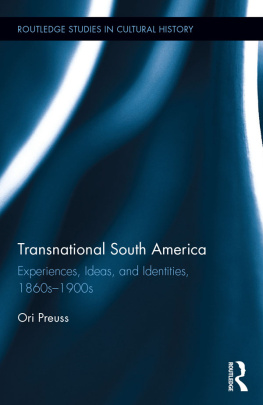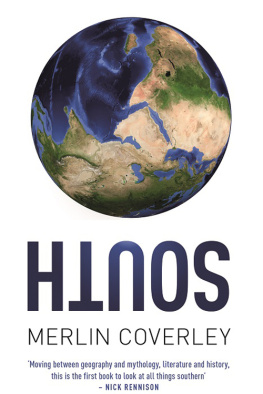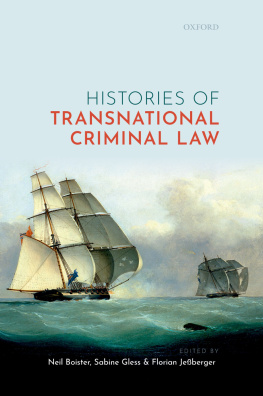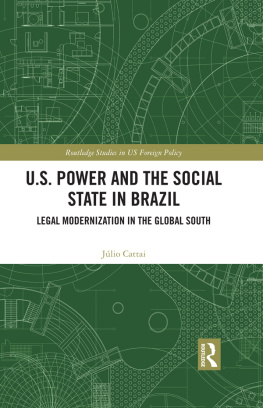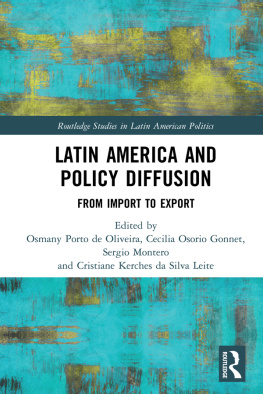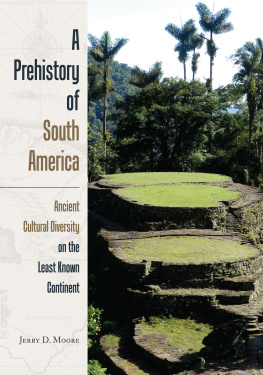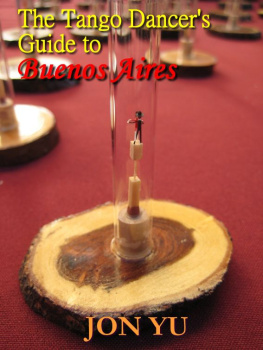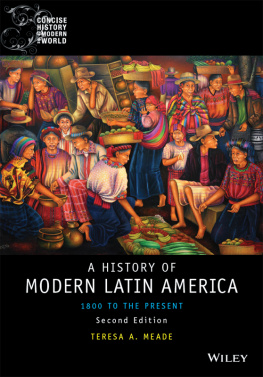Transnational South America
At the crossroad of intellectual, diplomatic, and cultural history, this book examines the growing transnational flows of people, information, and ideas between South American citiesmainly the port-capitals of Buenos Aires and Rio de Janeiroduring the period of their modernization. The book reconstructs this largely overlooked trend toward connectedness both as an objective process and as an assemblage of visions and policies concentrating on diverse transnational practices such as translation, travel, public visits and conferences, the print press, cultural diplomacy, intertextuality, and institutional and personal contacts. Inspired by the entangled history approach and the spatial turn in the humanities, the book highlights the importance of cross-border exchanges within the South American continent. It thus offers a correction to two major traditions in the historiography of ideas and identities in modern Latin America: the predominance of the nation-state as the main unit of analysis, and the concentration on relationships with Europe and the United States as the main axis of cultural exchange. Modernization, it is argued, brought segments of South Americas capital cities not only close to Paris, London, and New York, as is commonly claimed, but also to one another both physically and mentally, creating and recreating spaces, ways of thinking, and cultural-political projects at the national and regional levels.
Ori Preuss is Assistant Professor of Latin American History at Tel Aviv University.
Routledge Studies in Cultural History
For a full list of titles in this series, please visit www.routledge.com
18Neutrality in Twentieth-Century Europe
Intersections of Science, Culture, and Politics after the First World War
Edited by Rebecka Lettevall, Geert Somsen, and Sven Widmalm
19Americans Experience Russia
Encountering the Enigma, 1917 to the Present
Edited by Choi Chatterjee and Beth Holmgren
20A Social History of Disability in the Middle Ages
Cultural Considerations of Physical Impairment
Irina Metzler
21Race, Science, and the Nation
Reconstructing the Ancient Past in Britain, France and Germany
Chris Manias
22Identity, Aesthetics, and Sound in the Fin de Sicle
Redesigning Perception
Dariusz Gafijczuk
23Disease and Crime
A History of Social Pathologies and the New Politics of Health
Edited by Robert Peckham
24Critical Perspectives on Colonialism
Writing the Empire from Below
Edited by Fiona Paisley and Kirsty Reid
25Old World Empires
Cultures of Power and Governance in Eurasia
Ilhan Niaz
26The Afterlife of Used Things
Recycling in the Long Eighteenth Century
Edited by Ariane Fennetaux, Amlie Junqua and Sophie Vasset
27Holocaust Consciousness in Contemporary Britain
Andy Pearce
28The Invention of Race
Scientific and Popular Representations
Edited by Nicolas Bancel, Thomas David and Dominic Thomas
29Indigenous Networks
Mobility, Connections and Exchange
Edited by Jane Carey and Jane Lydon
30Shadows of the Slave Past
Memory, Heritage, and Slavery
Ana Lucia Araujo
31Expedition into Empire
Exploratory Journeys and the Making of the Modern World
Edited by Martin Thomas
32Luxury and Gender in European Towns, 17001914
Edited by Deborah Simonton, Marjo Kaartinen and Anne Montenach
33Reassessing the Transnational Turn
Scales of Analysis in Anarchist and Syndicalist Studies
Edited by Constance Bantman and Bert Altena
34Conciliation on Colonial Frontiers
Conflict, Performance and Commemoration in Australia and the Pacific Rim
Edited by Kate Darian-Smith and Penelope Edmonds
35Scotland and the Caribbean, c.17401833
Atlantic Archipelagos
Michael Morris
36Case Studies and the Dissemination of Knowledge
Edited by Joy Damousi, Birgit Lang, and Katie Sutton
37Visualizing Jews Through the Ages
Literary and Material Representations of Jewishness and Judaism
Edited by Hannah Ewence and Helen Spurling
38Higher Education and the Growth of Knowledge
A Historical Outline of Aims and Tensions
Michael Segre
39New Perspectives on Russian-American Relations
Edited by William Benton Whisenhunt and Norman E. Saul
40The Holocaust in the Twenty-First Century
Contesting/Contested Memories
Edited by David M. Seymour and Mercedes Camino
41Jesuits at the Margins
Missions and Missionaries in the Marianas (16681769)
Alexandre Coello de la Rosa
42Travelling Notions of Culture in Early Nineteenth-Century Europe
Edited by Hannu Salmi, Asko Nivala and Jukka Sarjala
43Language as a Scientific Tool
Shaping Scientific Language Across Time and National Tradition
Edited by Miles MacLeod, Roco G. Sumillera, Jan Surman and Ekaterina Smirnova
44Transnational South America
Experiences, Ideas, and Identities, 1860s1900s
Ori Preuss
First published 2016
by Routledge
711 Third Avenue, New York, NY 10017
and by Routledge
2 Park Square, Milton Park, Abingdon, Oxon OX14 4RN
Routledge is an imprint of the Taylor & Francis Group, an informa business
2016 Taylor & Francis
The right of Ori Preuss to be identified as author of this work has been asserted in accordance with sections 77 and 78 of the Copyright, Designs and Patents Act 1988.
All rights reserved. No part of this book may be reprinted or reproduced or utilised in any form or by any electronic, mechanical, or other means, now known or hereafter invented, including photocopying and recording, or in any information storage or retrieval system, without permission in writing from the publishers.
Trademark notice: Product or corporate names may be trademarks or registered trademarks, and are used only for identification and explanation without intent to infringe.
Library of Congress Cataloging-in-Publication Data
CIP data had been applied for.
ISBN: 978-1-138-91100-0 (hbk)
ISBN: 978-1-315-69306-4 (ebk)
Typeset in Sabon
by Apex CoVantage, LLC
Pursuing this transnational project required me to cross the bridge from Brazil to Argentina. I am deeply grateful to Juan Pablo Scarfi, Paula Bruno, Ricardo Salvatore, Jorge Myers, and Pablo Buchbinder, for assisting me in this challenging and rewarding passage. I am equally thankful to Liliana Gomz-Popescu, Sven Schuster, and Marc Hertzman, who kindly invited me to present portions of this study in meetings at the universities of Dresden, Eichsttt, and Columbia, which greatly enriched my research. Georges Bastin, lvaro Fernndez Bravo, Liliana Brezzo, Noem Goldman, Nayelli Castro Ramrez, Fernando Degiovanni, Juan Manuel Fernndez, Michael Goebel, Beatriz Gonzlez-Stephan, Lorena Moscovich, Luis Roniger, Isis Sadek, David Sheinin, Barbara Weinstein, Thomas Whigham, and James Woodard, shared materials, gave advice, and provided enlightening comments on different occasions along the wayI thank them all, and especially Joo Paulo C. S. Rodrigues who read a semi-final version of the manuscript. At Tel Aviv University, I have been fortunate to work alongside excellent scholars and committed friends. I greatly appreciate the moral support and intellectual insights of Yoav Alon, Lior Ben David, Itamar Even Zohar, Israel Gershoni, Tal Goldfajn, Igal Halfin, Sylvie Honigman, Aviad Kleinberg, Avshalom Laniado, Irad Malkin, Shlomo Sand, Michal Shapira, and Sagi Schaefer. An especially deep debt of gratitude I owe to Gadi Algazi, Gerardo Leibner, Yardena Libovsky, Tzvi Medin, Rosalie Sitman, and the late Boaz Neumann whom I deeply miss. Finally, my gratitude goes to Maria Leal at the Oliveira Lima Library, Mariana Luchetti and the other personnel at the Complejo Museogrfico Enrique Udaondo in Lujn, and the entire exceptionally helpful staff of the Fundaao Casa de Rui Barbosa, as well as to Sharon Hirsch for her painstaking editing of the text, and to Nurit Hershkovits for the resourceful handling of the images.

